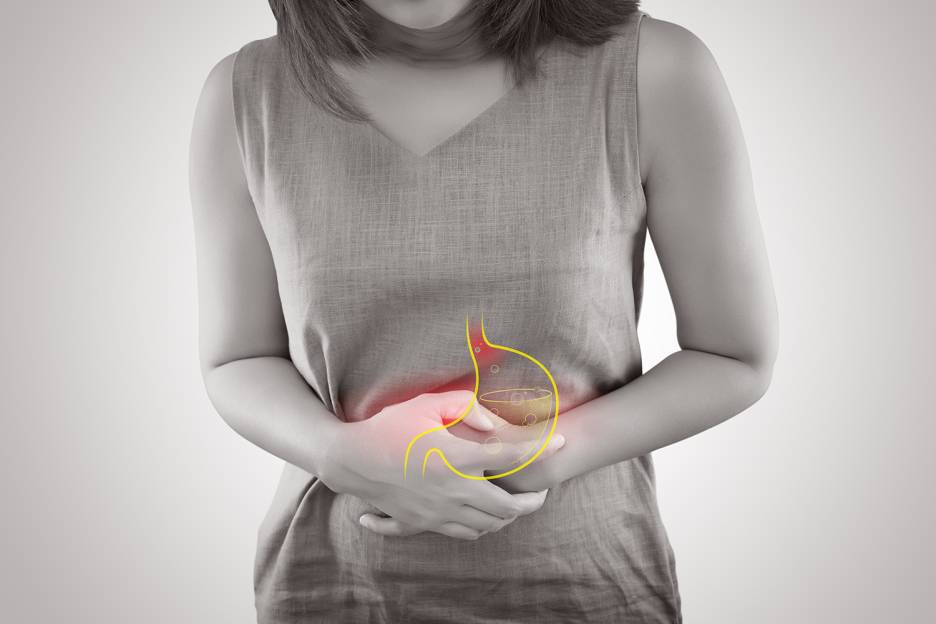
Monday – Friday: 10am – 7pm
Saturday: 10am – 6pm
Sunday: 1pm – 6pm

Many Americans suffer stomach problems of one kind or another. An estimated 40 to 44 percent of adults in this country experience stomach acid build up in the throat, a burning sensation commonly known as heartburn.
When heartburn and acid reflux become chronic (occurring two to three times a week or lasting at least three months), you may have gastroesophageal reflux disease (GERD). GERD has increased sixfold over the last 20 years and has been linked to throat cancer.
In normal digestion, the lower esophageal sphincter (LES) pinches shut to prevent hydrochloric acid (HCl)—needed to digest food in the stomach—from backing up into the esophagus (the tube connecting the throat and the stomach). In GERD, HCl splashes up into the esophagus, irritating sensitive tissues. While this can happen to anyone at any age, GERD is most likely to affect people over 50 and pregnant women.
In pregnancy, abdominal pressure and increased levels of the hormone progesterone can relax the LES, causing heartburn. Hiatal hernia, a structural problem where the stomach pushes up into the diaphragm, can also result in heartburn. Other causes of heartburn include:
While it seems counterintuitive that low levels of HCl could cause the burning pain of GERD and heartburn, this is often the case.
“At least half of older people with heartburn actually have too little stomach acid,” explains Martie Whittekin, CCN.
An integrative physician can measure your stomach acid to see if it’s deficient. Stomach acid performs numerous vital functions. It’s the first line of defense against fungi, viruses, and bacteria, including H. pylori, which has been linked to ulcers.
Low stomach acid—from acid-suppressive drugs—can even lead to pneumonia and other respiratory infections. Stomach acid is also necessary for the absorption of some vitamins and minerals.
“One startling example is magnesium,” says Whittekin. “Magnesium deficiency is a common cause of sudden death from heart arrhythmia—and the body’s uptake of this mineral is reduced when stomach acid is blocked” with antacids or proton pump inhibitors (PPIs).
Among the most widely prescribed medications worldwide, PPIs cause abdominal pain, constipation, diarrhea, dry mouth, flatulence, headache, and nausea.
Over the long haul, these drugs upset the body’s natural pH balance and the production of parathyroid, a hormone involved in bone remodeling. No wonder research links PPIs with osteoporosis and related hip fractures.
If your stomach acid is low, stop taking acid-suppressing drugs. Should heartburn strike, “drink some club soda,” says Hyla Cass, MD. Tap water that contains chlorine and fluoride should also be avoided, as these minerals decrease enzymes that help the stomach produce much-needed acid, adds Whittekin.
Dr. Cass also recommends drinking fresh cabbage or potato juice. "To prevent GERD, drink 8 ounces of water with 1 tablespoon of apple cider vinegar about 30 minutes before each meal,” she adds. “Take digestive enzymes with each meal. Use a mixed blend of amylase, lipase, and protease enzymes.”
And eat more raw fruits and vegetables, which also contain enzymes. A plant-based diet benefits a number of digestive problems, including GERD. Prebiotics (including fructooligosaccharides and inulin extracted from fruits and veggies) help feed friendly bacteria (probiotics) that fight pathogens, which cause digestive and respiratory infections. Eat smaller, more frequent meals.
“Chew your food very thoroughly,” adds Dr. Cass, “until it is liquid in your mouth.”
Try not to eat when you’re stressed. Instead take a few minutes to center yourself and breathe deeply before eating. Avoid clothing that’s tight around the waist. Don’t lie down within three hours of eating, and elevate your head at night. Sleeping on your left side, which keeps the stomach below the esophagus, also helps.
Chronic underproduction of HCl may indicate vitamin B1 or zinc deficiency. Low levels of vitamin B12 may weaken LES, leading to GERD. Unfortunately, a number of medications (including PPIs) reduce the absorption of this vitamin. Take a well-balanced B complex to maintain adequate levels of these important water-soluble vitamins. Sufficient stomach acid is also needed for zinc absorption, perhaps helping to explain why Americans are low in this mineral. Since zinc is crucial in healing tissue—whether in the esophagus or stomach—make sure it’s in your daily multi.
Calcium (especially in supplement form) and magnesium are poorly absorbed without enough HCl. Acid-blockers reduce vitamin D, which works hand-and-hand with calcium and phosphorus.
Iron stores, particularly important to women of child-bearing age, can also be depleted by antacids and PPIs. Consult your healthcare provider if you feel tired; you may need to supplement this mineral as well.
To heal damage caused by GERD and acid-blocking drugs, consider deglycyrrhizinated licorice (DGL), and zinc-carnosine, which exerts a powerful anti-inflammatory effect. Both are also useful for those with ulcers. For low HCl, consider taking bitters (a combination of digestive herbs) with meals. Aloe vera is as soothing to the digestive tract as it is to external burns and wounds. But avoid products with a very bitter taste or capsules promising laxative effects; they may be too harsh for irritated tissues.
Anti-inflammatory curcumin (a component of the spice turmeric) is also therapeutic for people with GERD. Best known for its relaxing effects, chamomile tea has been approved for “gastrointestinal spasms and inflammatory diseases of the gastrointestinal tract” in Germany. Just don’t drink too much tea, as it reduces needed stomach acid.
Whatever you do, don’t ignore GERD. This condition can lead to serious health problems and may mimic early symptoms of angina or heart attack. With so many safe natural solutions to stomach pain, there’s no reason to fear a diagnosis of acid reflux.